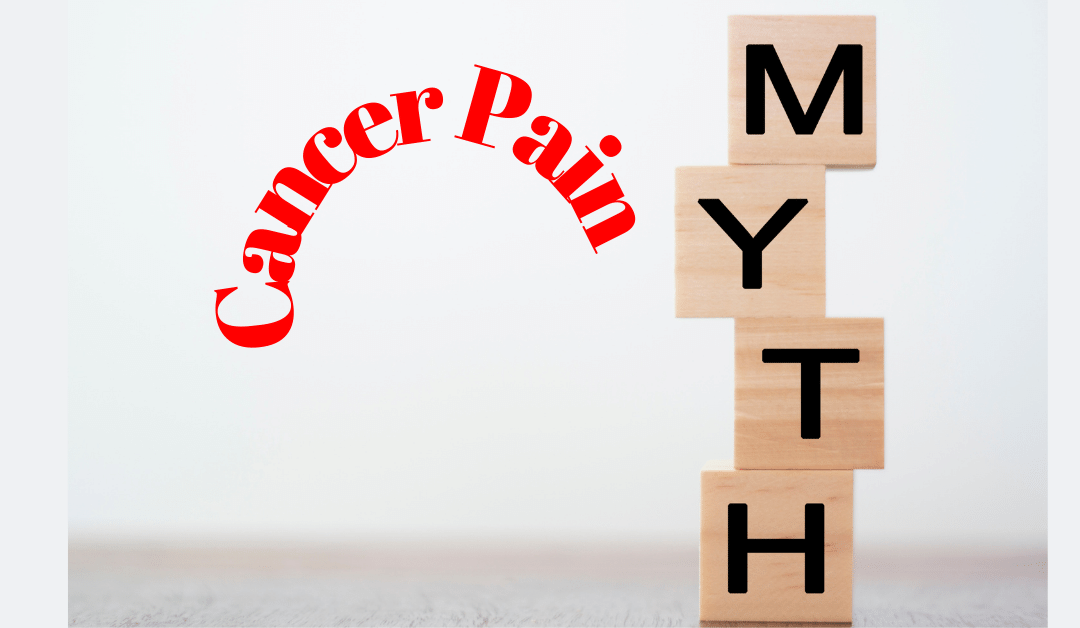
by Bag It Team | Sep 14, 2021 | Educational Articles

Myth #1: Everyone experiences pain with cancer.
Facts:
- About half of people with cancer experience pain at some point – but about half don’t.
- Pain management is part of cancer treatment. In most cases pain can be controlled.
- Those with advanced cancer usually experience more pain than someone newly diagnosed.
Learn about the different types of pain, its causes, and how pain can be measured Causes of cancer pain: Pain can be caused by the tumor itself, cancer tests or procedures done, or it can occur as a side effect of treatment (surgery, chemotherapy, immunotherapy, radiation therapy). There can be more than one cause of pain. Some pain ends when treatment ends but some pain can be ongoing and chronic. Types of Pain:
- Acute pain – this type of pain comes on quickly but it does not last long. It can be mild, moderate, or severe.
- Chronic pain -this type of pain can be consistent or it can get worse, lasing a long time. Again, it can be mild, moderate, or severe.
- Breakthrough pain – this type of pain is usually a sudden increase in intense pain that “breaks through” the pain medications being taken to control pain, typically between does. It lasts for a short time. There are medications specifically used to treat this type of pain.
Pain Severity: Everyone experiences pain differently. It’s a good idea to keep a record of your pain to share with your healthcare team. Using one of the customizable logs in section 2 of Bag It’s My Companion Guidebook is an easy way to track your pain. You can use the scale below to assess your pain’s severity and type, noting when, where, how it feels (e.g. “burning,” “stabbing,” “throbbing) and other pertinent details on the form. Make copies to give to your healthcare team at your next appointment. This will help them to determine a pain management plan tailored just for you. Using a scale from “0” to “10”:
- 0 means no pain
- 1 to 3 means mild pain
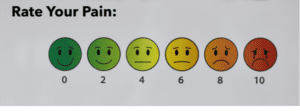
- 4 to 6 means moderate pain
- 7 to 10 means severe pain
Myth #2: Only opioid medications relieve cancer pain.
Facts:
- Non-opioid medications may be effective pain relievers depending on the type of pain someone is experiencing.
- Palliative surgery or radiation therapy is sometimes performed to ease symptoms and increase comfort.
- Palliative (supportive care) is care that focuses on relieving the symptoms of cancer, like pain, and other impacts on your physical, emotional, mental and spiritual well-being.
- Physical therapy, exercise, complementary and integrative medicine therapies such as acupuncture, massage and relaxation techniques are possible ways to manage pain without medication.
A personalized pain management plan prescribed by your healthcare team could include one or more of the above treatments to improve your quality of life. It’s important to talk openly with your healthcare team if you are experiencing pain. In addition to describing the pain in detail, let them know how it is impacting your daily life.
Palliative care (supportive care)
Palliative care is not hospice care. The aim of palliative, or supportive, care is to improve quality of life and maintain independence by reducing symptoms, managing pain, and supporting patients and their families. The aim of hospice care is to help the patient approach the end of life with peace, respect, and dignity, and it includes palliative care. Palliative care is an approach to care that addresses the person as a whole, not just their disease. The goal is to prevent or treat, as early as possible, the symptoms and side effects of the disease and its treatment, in addition to any related psychological, social, and spiritual problems. You can receive palliative care at any age and at any stage. Receiving palliative care does not mean that you will no longer receive treatment for the disease. People often receive treatment to slow, stop, or eliminate cancer in addition to treatment to ease discomfort. In fact, research shows that people who receive both types of treatment often have less severe symptoms, a better quality of life, and report they are more satisfied with treatment. Ask your healthcare team about the ways palliative care might be helpful to you and your family.
Additional Resources on Pain
ASCO Answers: Managing Cancer-Related Pain
Cancer Pain Control: Support for People With Cancer
ASCO’s booklet, Palliative Care
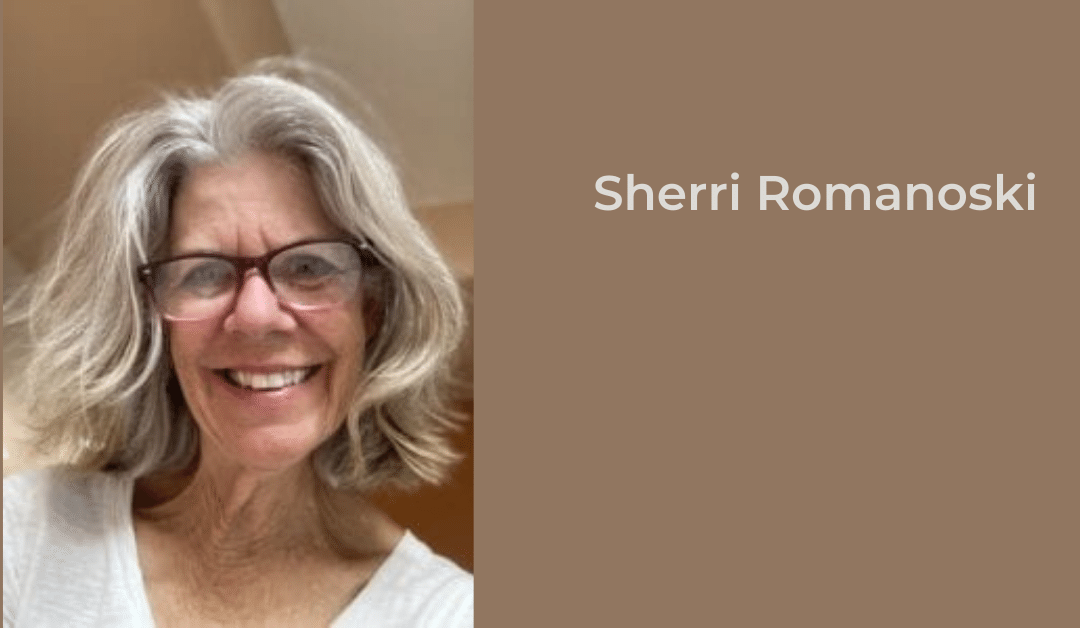
by Sherri Romanoski | Jun 23, 2021 | Blog
Survivorship is such a tenuous concept. Who is a survivor? What’s the measurement stick? Time? Quality of life? Remission? Cancer-free (for the time being)?
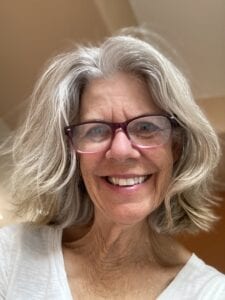
Sherri in 2021
The term “survivor” resonates with so many but it just never has felt a right fit to me. I do feel like I survived something….but it might not be exactly the cancer I was diagnosed with almost 20 years ago. That is still hanging around in forms of neuropathy and other nagging long-term and late-effect issues. I still get the heebie jeebies when I go for screening. Lots of self-talk. That doesn’t sound like a true, viable survivor attitude in my head.
What I did survive was learning how to do something extremely difficult and challenging and come out on the other side. Some days are better than others, but it IS on the other side. I survived telling my teenage sons I had cancer when I could barely get the stupid word out. I survived all those disappointing non-reactions and reactions from family, friends and colleagues. I survived my husband growing a beard for some odd reason when I was going bald. No justice in that! I survived throwing up in the chemo room (at lunch time of course – amazing how quickly people can tuck away a sandwich!) I survived the health care system that wasn’t exactly all that helpful on the social/emotional side of things. I survived realizing that my life was not eternal.
Looking for the Humor
And surviving cancer is not without humor. Telling my class of kindergartners and parents that I had cancer was a challenge, especially showing up with 1” hair (a different color of course) sticking up all over my head. And no eyebrows. That I nearly did not survive. I never learned the trick of eyebrow liner. Always ended up with these winging designs that sent me into fits of laughter. I kept telling the kiddos that yes, it really was me. I got a call from the school office after I made my first classroom visit to come “pick up a personal item.” Turned out to be my new breast prosthesis that apparently I did not have the correct knack of using. It had fallen out of my shirt and onto the classroom floor. The kindergarteners were playing Frisbee with it across the room when the principal came in. Took him awhile to figure out just what it was. He had the substitute place it discreetly in a brown bag and take to the front office for “pick up.” I did survive the initial humiliation and then broke out in huge chuckles.
Taking a Leap of Faith
I survived the life-changing challenges of starting a cancer non-profit while continuing to teach. I had absolutely no business experience, just a passion to help educate and make things easier for others. I survived asking for LOTS of help which was not in my comfort zone. Today, almost twenty years later, we have a new executive director leading the way. I am blessed to still be involved in a meaningful way. Still surviving.
Surviving is not without its disappointments. With this work, I have not completely survived feeling so incredibly guilty around others with cancer that have metastatic disease and/or going through cancer treatment for chronic disease….no end in sight. I still struggle when fellow cancer advocates with chronic disease disregard my completed, past treatment thinking I can’t comprehend their chronic situation. That hurts. I don’t understand fully, but I really, really try.
Inspiring Other Advocates
How much of a challenge is it for someone surviving cancer to become an advocate for others in the same space? Tremendous! So I founded an annual leadership conference ten years ago for cancer advocates helping others with all types of cancer in all kinds of capacities (Escape to THRIVE). These advocates are filling gaps in cancer care all over the country. All of them not only surviving but taking that giant leap into helping others through all this. I hesitate to call it a journey…that’s so cliché these days but it is a voyage. We are all travelers in that cancer space. The courage of all these people that have CHOSEN to help others despite the constant reminder of their own cancer! They have taken on the job as advocate and guide. It takes such bravery as they are reminded almost daily of their own experiences. I get such extreme fulfillment from encouraging advocates to keep up their incredibly valuable work and stay well along the way. That’s the tricky part. If you want to keep surviving, you have to be aware of what you are asking the self to do.
Surviving and Moving Forward
I work hard at surviving…meditate as often as I can, sustained exercise like walking, swimming, hiking – some with friends and some solo. I recently learned the term “outgoing introvert.” Sounds like survival to me! I try to say “Enough!” when I need to and remind myself “I am Enough” when I need to.
So in the end, I consider myself not a survivor but surviving…the continual path of struggle and triumph, ease and fear, sadness and humor, hesitation and courage….surviving life, not just cancer.
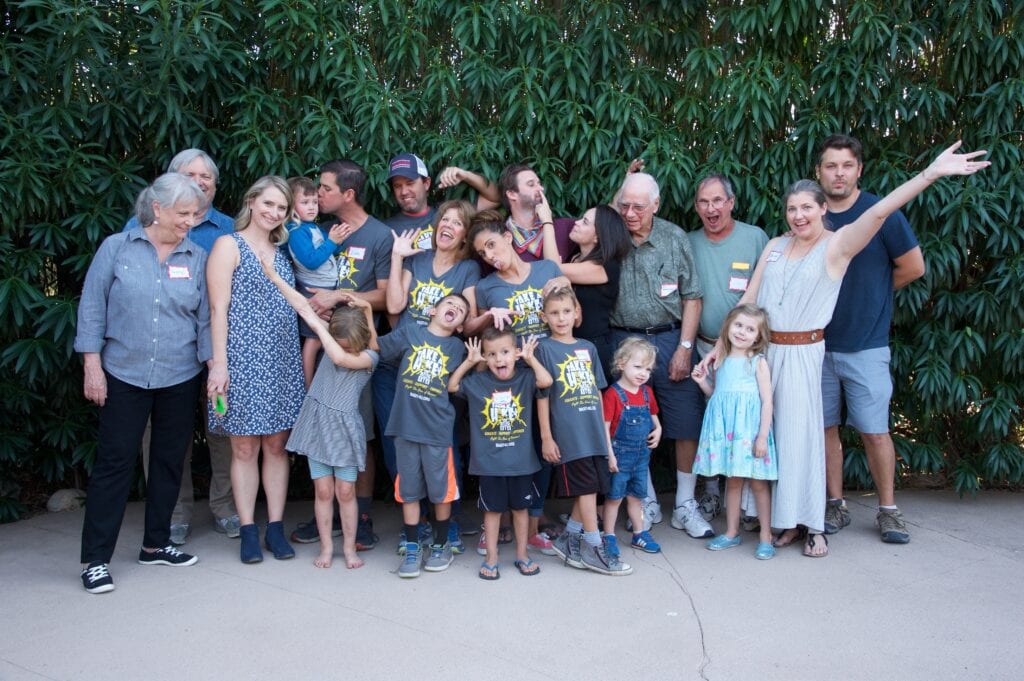
Sherri and her family supporting Bag It
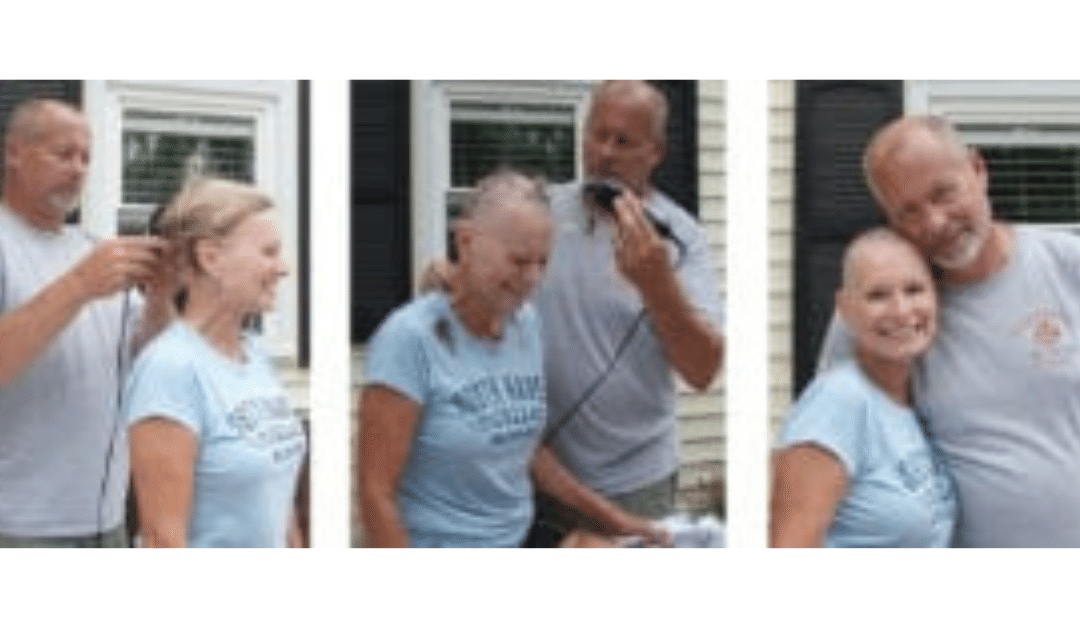
by Mindy Griffith | May 31, 2021 | Blog
Judy Pearson (who writes under Judith L. Pearson) is a published biographer who was diagnosed with Triple Negative Breast Cancer in 2011. Her quest for survivorship information eventually led her to recently publish From Shadows to Life: A Biography of the Cancer Survivorship Movement.
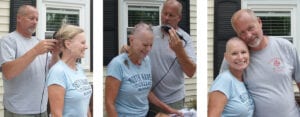
How did you first become interested in the cancer survivorship movement?
I founded A 2nd Act, a survivorship nonprofit, in 2016. Through it, I was introduced to Susie Leigh, one of the founders of the survivorship movement. That random introduction opened the door to the material that became this book.
Fifty years ago, President Richard Nixon signed the National Cancer Act. What impact did it have on the disease?
Prior to the 1970s, only 50% of those diagnosed with cancer survived their disease. And because of the fear that cancer was contagious, survivors lived as pariahs. President Nixon’s motivation for signing it and declaring war on cancer was reelection.
Unprecedented amounts of money were made available for research (and a cure helped) and won him a second term. But no one ever considered what life would be like for the increasing number of individuals who would survive the disease.
Much of your book is about the creation of the National Coalition for Cancer Survivorship (NCCS). What strides did it make in changing our country’s view of people who had been diagnosed with cancer?
First and foremost, the NCCS founders created a definition for survivorship. It begins at diagnosis, because that’s when someone begins surviving the disease, and it continues through the balance of life.
Remarkably, until nearly the turn of the 21st century, survivors were discriminated against on all fronts. They could lose their jobs and their insurance for disclosing a cancer diagnosis. NCCS’s early focus was on combatting this discrimination, from the halls of Congress to the bridge clubs and golf courses of small-town America.
They fought to improve healthcare, during and after cancer treatment, helping with the troubling longterm effects. And, like the canaries in the coal mine, all of the survivors’ experiences have helped inform current treatment modalities. Doctors have learned that less is often more, and that quality of life far outweighs quantity of life.
What work still needs to be done in the area of cancer survivorship?
When we’re diagnosed, we spend a period of time in a frenetic stage of diagnostics and treatment. But hopefully, that’s just a small blip on the timeline of one’s life. True, cancer doesn’t end when treatment does.
But there’s healing in helping. The survivorship movement was based on the veterans guiding the rookies. Advocating for ourselves and others will power the movement forward and benefit us. We are now the movement: survivors, caregivers, and medical professionals. So let’s get moving!
Do you want to hear more about Judy’s cancer experience and the history of survivorship? Join us on Sunday, June 6 as she helps Bag It celebrate National Cancer Survivors Day® with a virtual conversation. You can join the virtual presentation on Facebook or register to join the Zoom conversation.
Learn more about the event
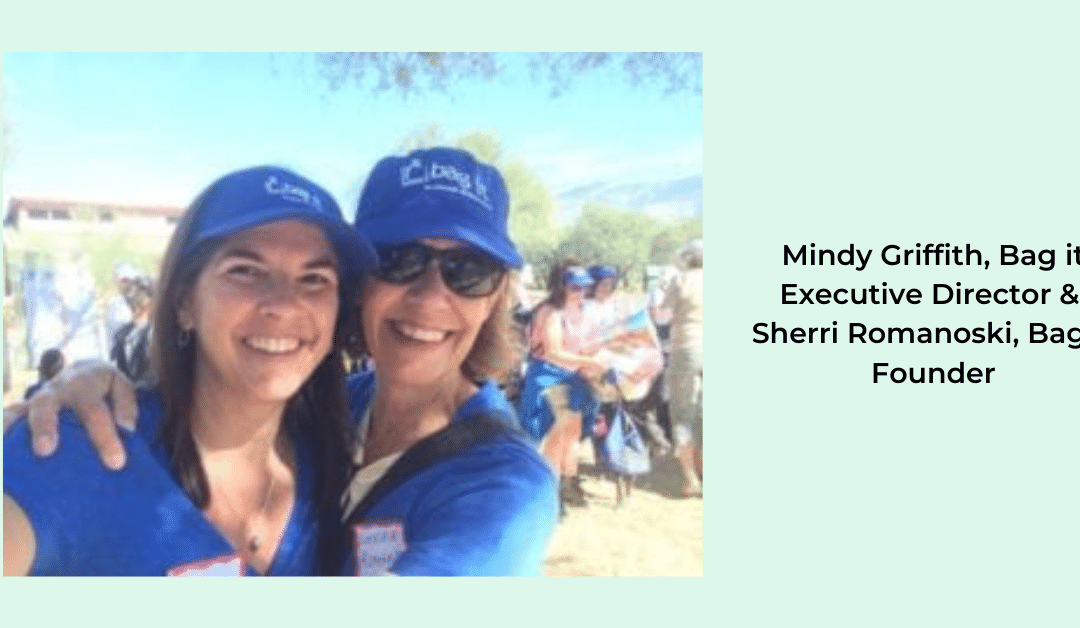
by Mindy Griffith | Feb 26, 2019 | Blog
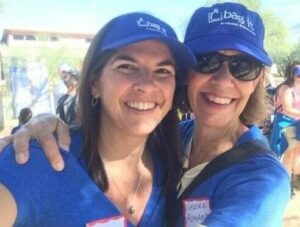
Mindy Griffith and Sherri Romanoski from Bag It
By: Lori McNeill, Arizona Oncology
Sherri’s Story
“I was shocked.” This, perhaps not surprisingly, was Sherri Romanoski’s response to being told back in 2000, at the age of 48, that she had breast cancer.
“It hit me hard. I was full of fear,” said Sherri.
Along with that fear can sometimes come a sense of powerlessness—how do I combat a disease I don’t fully understand?—and a lot of questions. What’s my cancer treatment plan? How long will it take? What can I do outside of the doctor’s appointments right now to help make a positive difference? How do I tell my family? What do I share, if anything, at work? What do I do about side effects? How am I going to pay for all these medications?
Read more . . .











Recent Comments